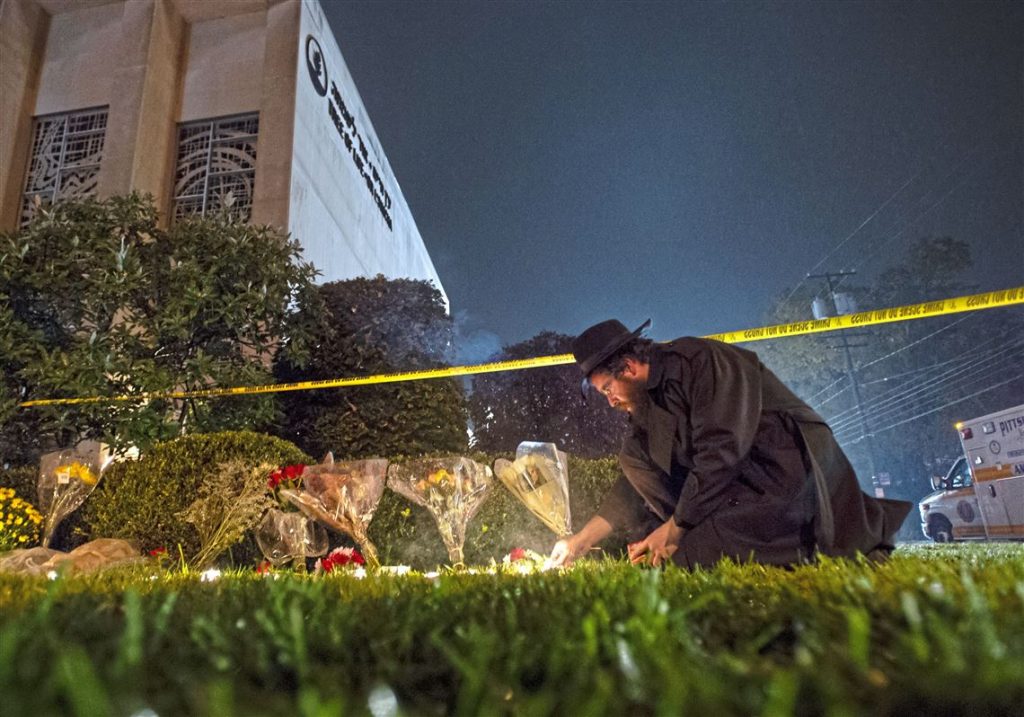
by Ellen Clark-King
On Saturday morning, like many, I went to my local synagogue for their Shabbat service – part of the #ShowUpForShabbat response to the Tree of Life Synagogue shooting. The local lead Rabbi is a supportive colleague of mine and becoming a friend – she and I have worked together on a number of inter-faith initiatives in the city and shared some of the stresses that come with being female leaders in large congregations.
I emailed her before deciding to go to check that a presence from Grace Cathedral would be welcome. Like many others, I feel such guilt over the part that the Church has played in antisemitism over the centuries that I wanted to make sure our going would be for their benefit rather than to assuage our own feelings. She graciously said how much it would mean for us to stand in solidarity with the synagogue.
When I preached on Job last Sunday in the aftermath of the shootings I said this: ‘There is only so far that words can take us in exploring the mystery of the world’s suffering. Our truest and best response to the shooting at Tree of Life Synagogue is not to explain its theological implications but to work to ensure such shootings never happen again. To take up our virtue and faith as peace-wielding weapons, as holy tools, against violence and hate. To counter antisemitism and all forms of racism whether we see it in others or in our selves. To take practical steps to addressing gun culture. To live out of love, compassion, kindness and forgiveness.’
What I maybe should have gone on to say is that one part of our work against antisemitism and racism is, in fact, theological work. It is bad theology that has allowed Christians to assume a moral and religious superiority to their Jewish siblings, and we need a new, better theology to replace it. The old one – supersessionism – comes from the same root as supersede and has the same sort of meaning of an improved replacement. In theological terms it means the belief that the Church has replaced the Jewish race as God’s chosen people. It has allowed Christians over the centuries to despise Jews as a people who failed God, who did not live up to God’s special calling, who have been left behind in the story of God’s interactions with the world.
We need instead a theology that values all the ways that God chooses people to serve and honour the divine. The Jewish people who learned to worship the one God, to argue and debate with God, to live out the prophets’ calling to care for the least among them; who gave birth to the one who showed God’s face to us, who continue to make God’s covenant a real and living thing – they have a shining calling that is their own. They are God’s beloved children now and always. As Paul says emphatically: ‘I ask then, has God rejected his people? By no means!’ (Romans 11:1)
As Church we need to speak from the pulpit against antisemitism, and we also need to speak against antisemitism whenever we hear it from our family, friends or colleagues. We need to shout with St Paul that God has not rejected God’s people. We need to change the culture so that such shootings as at the Tree of Life become increasingly unthinkable, and so that our Jewish siblings may have the same security and safety that (white middle-class) Christians enjoy. This is part of our calling as God’s beloved children.
The Rev. Dr. Ellen Clark-King is Executive Pastor and Canon for Social Justice, Grace Cathedral, San Francisco, CA

